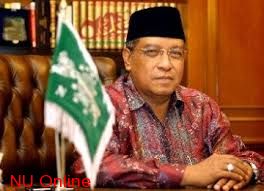Jakarta, NU Online
The general chairman of Nahdlatul Ulama (NU), the country’s largest Muslim organization, KH Said Aqil Siradj, has said that Indonesia was founded on values of peace and tolerance, and not exclusively on Islamic teachings.<>
During his speech at the National Resilience Institute’s (Lemhanas) golden anniversary on Wednesday, Said emphasized the role of religious figures in maintaining harmony in the country and how democracy and nationalistic values had kept the country together.
Said gave a speech titled Peranan Ulama dalam Membentuk dan Membela NKRI (The Role of Ulema in Shaping and Defending the Republic of Indonesia) in which he recalled the role of ulema or Muslim scholars during the struggle for the country’s Independence.
“Sukarno [Indonesia’s first president] invited members of NU to fight against invaders [colonizers]. [Nationalism] was part of their faith,” he said.
Said added that the NU’s ulema was at the forefront of defending the country’s ideology of Pancasila, which is based on democracy.
“Since [before Independence], members of NU declared that we were going to establish a darussalam [a peaceful country] instead of darul Islam [Islamic country],” he said, adding that the organization embraced the principle until now.
He also spoke of the danger of organizations that wanted to establish an Islamic state, which he said NU had long been fighting against.
“An organization that has the intention of establishing a religion-based state is a threat to Indonesia’s unity,” Said added.
Since the emergence of the Islamic State (IS) movement in Iraq and Syria, Indonesia, a country with the world’s largest Muslim population, has seen growing influence of the movement.
Hundreds of Indonesians have flocked to the war-torn countries to join the movement, including wives and children of extremists that had earlier joined the fight or relatives of members of local terrorist groups.
The government has started to engage in action to curb growing sympathy toward extremists in the country with the help of mainstream Muslim organizations, including NU and Muhammadiyah, the second-largest Muslim organization in the country.
The government has also claimed to be closely monitoring the Internet to stop the local campaigns of the group.
The institute’s anniversary coincides with National Awakening Day, which marks the emergence of Indonesian nationalism.
The institute, which is now under civilian management after restructuring in 2001, has been training Indonesian leaders since its establishment in 1965. The institute also has become a center for strategic studies, including food and political security, according to the institute.
The governor of the institute, Budi Susilo Soepandji, said the institute would continue to provide Indonesian leaders with training on leadership and nationalism, and continue to become a center for strategic studies.
“Lemhanas will continue the spirit of Sukarno when he established the institute. From the date of its establishment [May 20, which coincides with National Awakening day], we can actually tell what Lemhanas was established for,” he said. (masdar)
Terkait
Terpopuler
1
Gerhana Bulan Total Bakal Terlihat di Seluruh Indonesia pada Selasa 3 Maret 2026, Dianjurkan Shalat Khusuf
2
PBNU Instruksikan Qunut Nazilah Respons Agresi Israel-AS ke Iran
3
Gus Yahya Sebut Kepergian Ketum Fatayat Margaret adalah Kehilangan Besar bagi Keluarga NU
4
Ali Khamenei Wafat dalam Serangan Israel-Amerika
5
Innalillahi, Ketum Fatayat NU Margaret Aliyatul Maimunah Wafat
6
Ketua Umum PBNU Mengutuk Serangan AS-Israel atas Iran
Terkini
Lihat Semua



